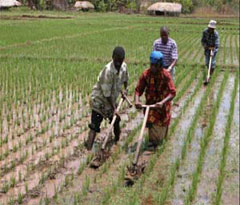Technical Cooperation in Supporting Service Delivery Systems of Irrigated Agriculture (Tanrice)
| Type | Project | Area | Period | Tanzania Organization |
Cost (Mill. Yen) |
|---|---|---|---|---|---|
| Tech | Technical Cooperation in Supporting Service Delivery Systems of Irrigated Agriculture (Tanrice) | Whole country | June. 2007 - June. 2012 | Ministry of Agriculture, Food Security and Cooperatives | 540 |
Maize and rice are the most important staple foods in Tanzania. Consumer demand for rice is increasing year by year and domestic production is failing to keep up with this demand. As a result, Tanzania requires increased imports of rice to maintain an adequate supply. Therefore, increasing rice production is an important agenda for national food security. With this as the background, the Government of Tanzania formulated a National Rice Development Strategy (NRDS) in 2009 targeting an increase in rice production of up to 1.96 million tons by 2018, thus doubling the production of 2008, through the intensification of irrigated paddy production.

Example of straight-row planting and manual weeding machines
Japan has been diligently working to develop the country's irrigated paddy cultivation since the 1970s, primarily in the Moshi Rural District in the Kilimanjaro Region. The resulting rice yields have already reached 6 tons per hectare, easily outstripping the national average, which stands at about 2 tons per hectare. Since the 1990s, to further spread these successes, the Kilimanjaro Agricultural Training Center (KATC) has been a key institution and efforts have been made to increase rice production by establishing and implementing various agricultural training programmes for agricultural extension officers, irrigation technicians and farmers.
The objective of the project is to ensure that these methods are adopted at four agricultural training institutes to help increase rice production in the rural communities of Tanzania. The farmers who participated in the training are expected to share their knowledge with other farmers. The training covers a package of inexpensive but important basic farming techniques, such as ridge management, field leveling, straight-row planting, and the use of handmade weeding machines. Furthermore, the training is conducted with an eye towards gender equality by encouraging equal participation by men and women. The goal within the project is to spread this training to 44 irrigation schemes over a five-year period. Additional support is being provided to improve the production of upland rice by the selection of improved varieties, including the New Rice for Africa (NERICA).





scroll